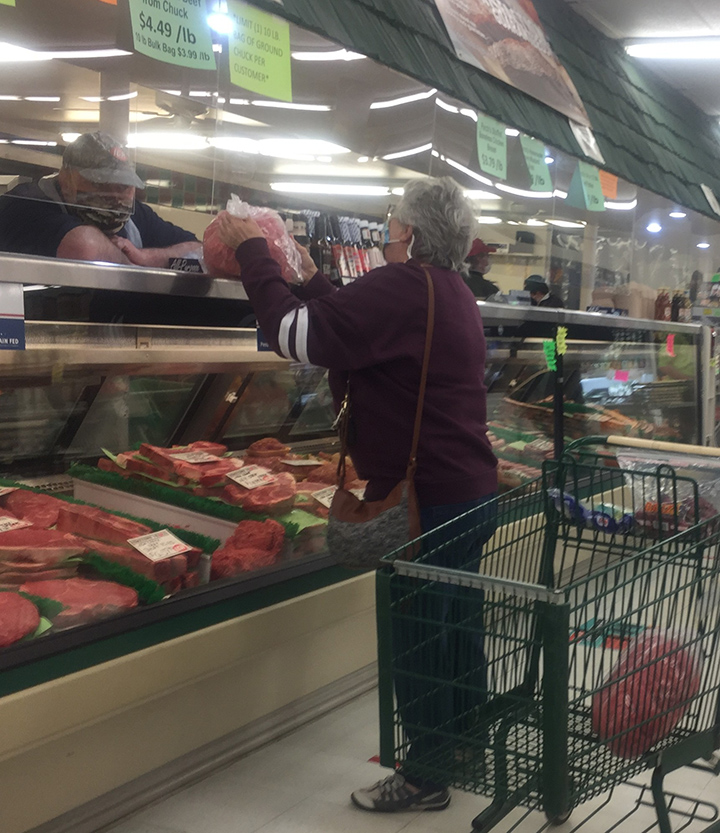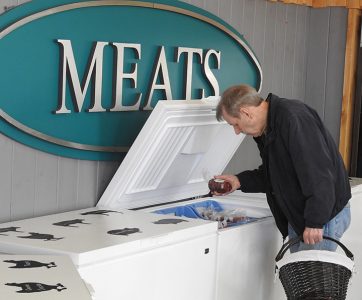‘Not good’: There’s meat here, but supply limited and prices high

News Photo by Julie Riddle A shopper at Perch’s IGA in Alpena hefts a bag of ground beef, which, like many other meats, has gotten expensive in recent weeks as grocers wait for shipments in an industry adjusting to coronavirus-related complications.
ALPENA — “What do you hear about the price of meat?” a customer asked.
“Not good,” came the reply from behind the meat counter at Perch’s IGA in Alpena on Wednesday.
Meat shelves across the country have been empty following coronavirus-related closures at major meatpacking plants such as Tyson, where one-third of the workforce tested positive for COVID-19, the disease caused by the virus, and several employees died.
While many such plants are up and running again — albeit with fewer employees — meat is slow in making its way to Northeast Michigan retailers and will be for some time, grocers say.
Customers, encountering less product and higher prices, have turned to new sources of meat while waiting for their shopping experience to, perhaps, go back to normal.

News Photo by Julie Riddle A customer selects pork hocks for a pot of bean soup on Thursday at Plath’s Meats in Rogers City. Meat prices have risen while supply has decreased locally in response to coronavirus-related challenges to the meat industry.
Northeast Michigan saw some good news on Thursday as local health officials reported no new cases or deaths but that two more Northeast Michigan residents had recovered from the disease.
As of Thursday, six Northeast Michiganders have recovered, meaning they have lived 30 days since either the onset of symptoms or testing positive: one Alpena County resident, two Presque Isle County residents, one Alcona County resident, and two Montmorency County residents.
Local health departments say 88 Alpena County residents, 11 Presque Isle County residents, five Montmorency County residents, and five Alcona County residents have been infected, and nine have died: eight from Alpena County and one from Alcona County.
FROM $4 TO $28
At Perch’s, the meat case is full and many options are available. Prices, though, have risen at a breakneck pace.

News Photo by Julie Riddle A customer checks out the inventory in the meat coolers at Alpena General Store in Alpena on Wednesday.
A chuck roast, once $4 a pound, now costs $28, employee Turk Turske said, sliding the slab of meat onto a scale.
Meat is still coming north, but there’s not as much of it, and suppliers are forced to charge more — a cost that has to be passed on to customers, Turske said.
People are still buying, he added, and, for the most part, customers have been understanding that there’s nothing to be done about the higher prices, at least for now.
When stay-at-home orders were first issued in mid-March, people snatched up certain store items, from hand sanitizer to toilet paper. Meat, too, was purchased in large quantities by worried shoppers hoping to stock up, causing some stores to limit sale amounts.
Now, Turske said, customers aren’t so desperate — just resigned to having to pay more for what many consider an everyday staple.
Supply is gradually increasing to retailers, with suppliers reducing order sizes across the board to ensure meat is distributed equitably.
Still, Turske has heard, it could be August before the meat world is back to normal.
Cuts of meat on cellophane-covered foam trays can still be found at large Alpena retailers like Meijer and Walmart, though some shelves are empty. Signs at Meijer advise customers that supply is limited and purchases must be limited, too.
In a normal summer week, Plath’s Meats in Rogers City would process a ton of belly meat into bacon each day.
The shop did receive a few-ton belly order this week, and shoppers will still be able to take home pink-and-white strips from the business’s retail stores in Rogers City and Petoskey, co-owner John Plath said.
Not all his orders get filled, though.
While the nation’s farmers have raised plenty of animals, there aren’t enough workers to process it fast enough to meet demand, Plath said.
Like most retailers in the area, he has to wait and see what the shippers bring, and pay the higher prices they have to charge.
In 107 years in business, he’s never had to charge so much for pork and beef, he mourned. Ground beef is particularly expensive, and the price of his famed bacon is as high as it’s ever been.
Click through the interactive timeline below to see how the virus spread in Northeast Michigan. Story continues below timeline.
Usually, Plath ships meats to restaurants, but those orders have stopped, with dining rooms closed to the public. He does still ship meat to customers all over the country — at least, when he gets what he orders.
If retailers and customers can make it another month with less product and higher prices, things will start to settle down and prices will start to drop, the meat grocer hopes.
Stores shelves may be depleted, but farms are still full of cows, pigs, and chickens. As retailers wait for their meat supply to increase, northern Michigan livestock farmers have a ready supply of meat, both to fill their own freezers and to sell to others.
Spring is usually a slow season at Bucky’s Meats, a meat-processing company in Lachine.
Not this year, said owner Alisha Manning. A waiting list extends until mid-June.
Meat-eaters, hungry for lower prices and the cuts they can’t find in stores, are eagerly buying a quarter- or half-cow from local farmers, who have all the customers they want right now, Manning said.
Some farmers can’t sell their livestock to larger processing plants, which don’t have the manpower to process them, so those animals are going to individual buyers. Butcher shops downstate are booked through September, Manning has heard, and animals are being hauled north, keeping local processors busy.
Bucky’s usually sees a spike in customers during county fair season, she said — a trend she anticipates will continue this year, as fair planners consider virtual auctions for the animals that have been raised by farmers and dedicated 4-H kids all year.
People keep calling and stopping by the business, hoping to buy a steak or tray of meat.
They don’t have a meat counter, Manning has to tell them — although, she added cheerfully, she can help them buy half a cow, if they’re interested.
Blending the concept of locally-sourced, farm-raised meat with storefront familiarity, Alpena General Store, on the corner of Washington Avenue and Ripley Boulevard, sells pre-packaged meat that comes only from northern Michigan animals.
The store typically takes in and sells the meat of two steers a month, said manager Stacey Horton. With other businesses unable to rely on full orders from out-of-the-area suppliers, the small store is trying to increase its supply of meat to make sure shoppers can find what they’re looking for.
A lot of new faces have shown up in the shop in recent weeks, Horton said, many looking for the beef, pork, chicken, and lamb kept in the large white coolers that line the store, supplied by two farmers in Ossineke.
A small butcher in the Buckley area processes the store’s meat, and they’re helping a lot of customers right now, Horton said.
Stores, and customers, can get the meat they want, she said — but, when an entire industry is adjusting to a different way of doing things, “you have to wait your turn.”
Julie Riddle can be reached at 989-358-5693, jriddle@thealpenanews.com or on Twitter @jriddleX.
- News Photo by Julie Riddle A shopper at Perch’s IGA in Alpena hefts a bag of ground beef, which, like many other meats, has gotten expensive in recent weeks as grocers wait for shipments in an industry adjusting to coronavirus-related complications.
- News Photo by Julie Riddle A customer selects pork hocks for a pot of bean soup on Thursday at Plath’s Meats in Rogers City. Meat prices have risen while supply has decreased locally in response to coronavirus-related challenges to the meat industry.
- News Photo by Julie Riddle A customer checks out the inventory in the meat coolers at Alpena General Store in Alpena on Wednesday.







